You want to purchase reliable motorcycle oil, right? We’ll examine the best motorcycle oils of 2023 in this article, along with advice on how to pick the best one for your motorcycle.
- Best Overall: Castrol Motorcycle Oil
- High Quality: Valvoline 4-Stroke Motorcycle Oil
- Best Performance: Kawasaki Motorcycle Engine Oil
- Another Great Option: Motul Aceite Motorcycle Oil
- Best Value: Honda Pro GN4 Motorcycle Oil
- Best Synthetic: Mobil 1 Racing Engine Oil
- Best for Hot Weather: Lucas High-Performance Motorcycle Oil
- Best for Cold Weather: K&N 10W-40 Synthetic Motor Oil
Oil is necessary for motorcycles because it keeps their engines clean and lubricated and shields them from corrosion, overheating, and seizing.
Wet-clutch lubrication, transmission, and many other functions require the use of special oils because motorcycle engines have high rev ranges and are susceptible to a quicker wear. In essence, oil is to a motorcycle what oxygen is to your bloodstream.
It’s time to identify the motorcycle oil you believe to be the best. We can assist you in making the best motorcycle oil selection. In fact, that is why we are here today—to give you advice about motorcycle oils and to present you with the best options.
Best Motorcycle Oils in 2023
- Best Overall: Castrol Motorcycle Oil
- High Quality: Valvoline 4-Stroke Motorcycle Oil
- Best Performance: Kawasaki Motorcycle Engine Oil
- Another Great Option: Motul Aceite Motorcycle Oil
- Best Value: Honda Pro GN4 Motorcycle Oil
- Best Synthetic: Mobil 1 Racing Engine Oil
- Best for Hot Weather: Lucas High-Performance Motorcycle Oil
- Best for Cold Weather: K&N 10W-40 Synthetic Motor Oil
Best Overall: Castrol Motorcycle Oil
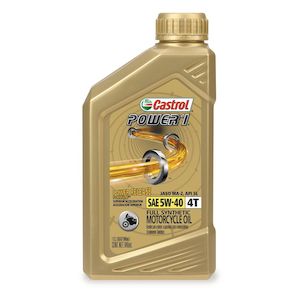
Pros
- Offers maximum engine, clutch, and gear protection
- Offers superior acceleration
- Fast-flowing for better throttle performance
Cons
- Poor bottle packaging
The Castrol motorcycle oil at the top of our list has a viscosity rating of 10W-50. This oil uses race-derived technology and a fast-flowing formula for maximum engine acceleration. Its tri-zone technology protects and lubricates the bike’s clutch, gearbox, and engine, which are its three most important performance areas.
You can prevent viscosity breakdowns on your motorcycle by using this oil, which has excellent shear stability. This synthetic, high-quality motorcycle oil promises excellent water-cooled engine performance and includes additives that make sure all of the hard-working engine’s components are firing on all cylinders.
High Quality: Valvoline 4-Stroke Motorcycle Oil
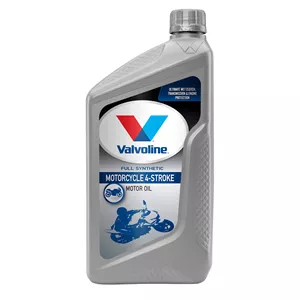
Pros
- Enhances acceleration and power
- Wear and corrosion protection
- Suitable for high-performance functions
Cons
- Not suitable for very high cc motorcycles
This Valvoline motorcycle oil is a fully synthetic SAE 10W-40 motor oil that will not only increase the power of your bike but also give all of its engine components the best possible protection.
It has been carefully formulated to offer strong acceleration and superior lubrication for seamless shifting and operation. You can benefit from the excellent wet-clutch protection provided by this motorcycle oil, which is essential for efficient shifting and maximum power transfer.
Additionally, it extends defense against potentially dangerous deposits that might otherwise degrade performance and reduce engine longevity. This oil is created to keep the engine prepared for high performance, high temperatures, wet clutch systems, and high RPMs, allowing you to quickly get your bike out of the garage and back on the road.
Best Performance: Kawasaki Motorcycle Engine Oil
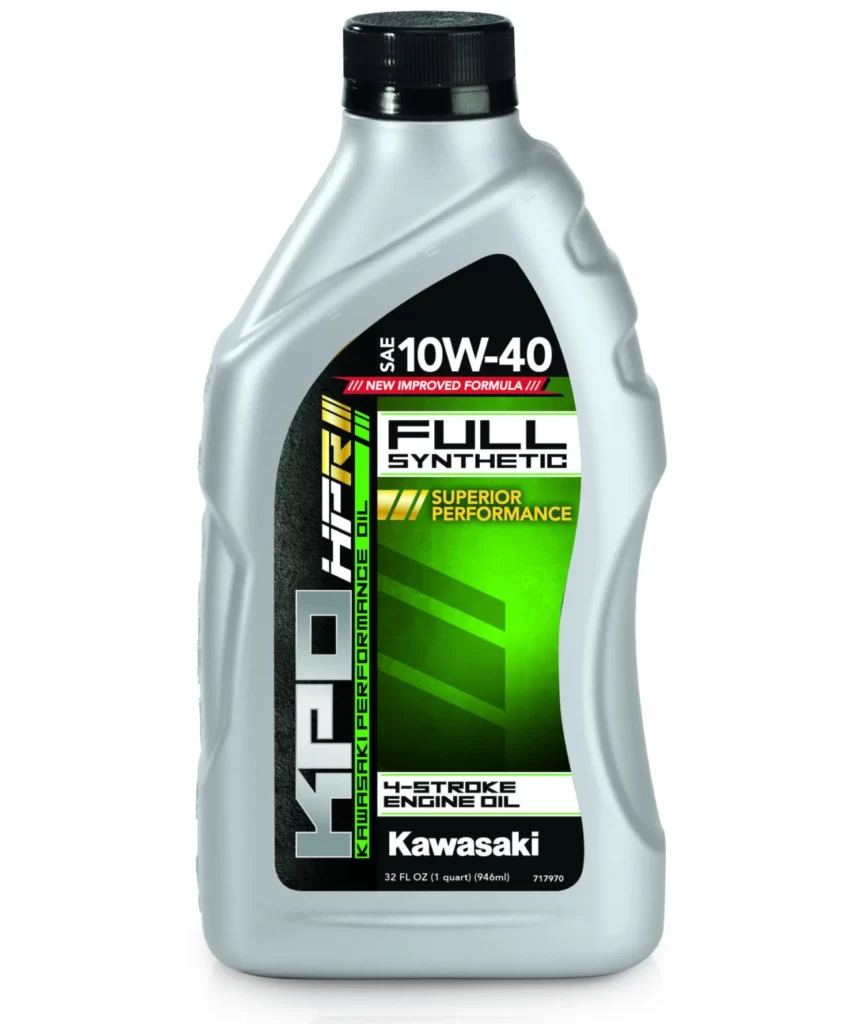
Pros
- Reduced oil volatility
- Outstanding engine performance and power
- Dependable and offers smooth shifting
Cons
- Not a synthetic motorcycle oil
All-terrain vehicles, street sport motorcycles, utility vehicles, scooters, and many other types of vehicles can benefit greatly from the use of this Kawasaki 4-stroke engine oil. This SAE 10W-40 motorcycle oil is suggested for applications that call for particular kinds of engine oils, such as API SL, JASO MA2, and JASO MA engine oil, in addition to having a high degree of compatibility.
With unmatched bearing and engine protection, this highly lubricating motorcycle engine oil keeps the engine from overheating. It keeps the engine clean, which increases engine longevity, and this oil can also enhance transmission/clutch performance and function for quicker, easier shifting when you’re out on the open road, riding off into the distance.
Another Great Option: Motul Aceite Motorcycle Oil
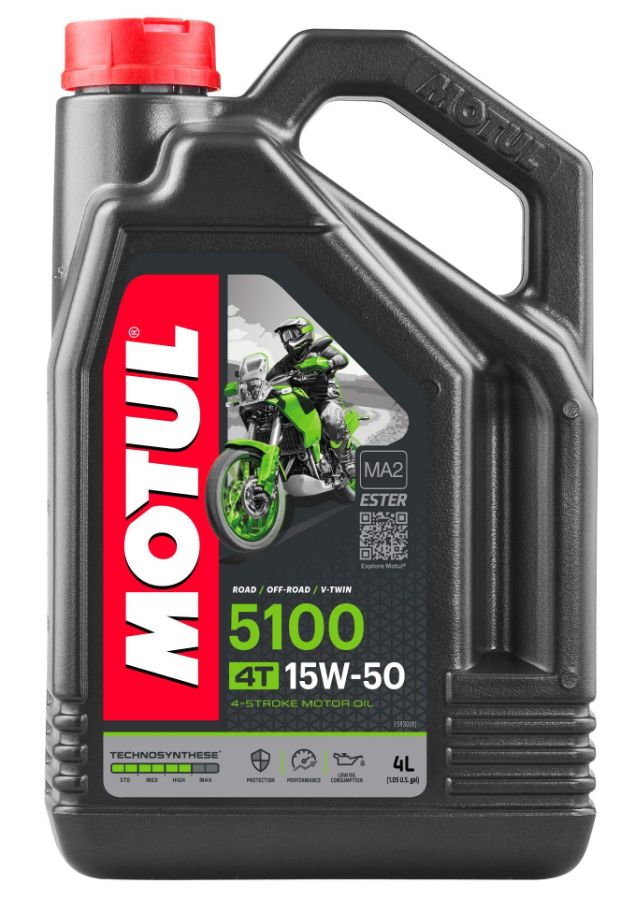
Pros
- Better engine-response timing
- Protects gearbox and engine
- Enhances shifting and starting
Cons
- Oil can be slightly volatile
This Motul motor oil is a very dependable lubricant with a reputation for enhancing motorcycle performance. It features new Ester technology, which enhances your engine’s responsiveness, and it is made to be used with all 4-stroke engines for more power and better acceleration.
The extreme pressure treatment in the formula of this motorcycle oil results in outstanding gearbox protection. It complies with API SL/SG/SH and JASO MA standards and has a low phosphorus and sulfur formula for motorcycles with catalytic converters.
This motorcycle oil, which is a synthetic blend, is a wise choice that will provide you with reliable outcomes while you’re driving.
Best Value: Honda Pro GN4 Motorcycle Oil
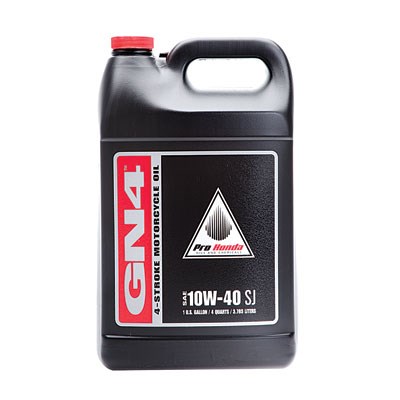
Pros
- Easy to use and great value for money
- Holds up dirt and remains clean
- Engine runs smoother
- Smooth clutch shifting
Cons
- Not suitable for high-heat, air-cooled, racing motorcycles
- Creates stickiness around the filter
This reasonably priced oil may be ideal for your needs if you ride a liquid-cooled bike and are a casual rider. It comes in a sizable one-gallon container and is easily accessible. Despite the substantial volume at a reasonable cost, it is also made to last longer.
It has been designed to be more stable and better maintains viscosity consistency. Additionally, compared to other oils, it has higher shear resistance. You can ride longer between oil changes thanks to this method of preventing the oil from deteriorating.
Additionally, the improved stability better suspends contaminants and dirt, trapping them, and preventing them from harming your engine. This oil’s inadequacy for high-heat, air-cooled, and racing motorcycles is one of its disadvantages.
These conditions are too difficult for this oil to handle. A sticky feeling could also be developing around the filter. Your bike’s performance isn’t affected; all it does is make the filter untidy.
Best Synthetic: Mobil 1 Racing Engine Oil
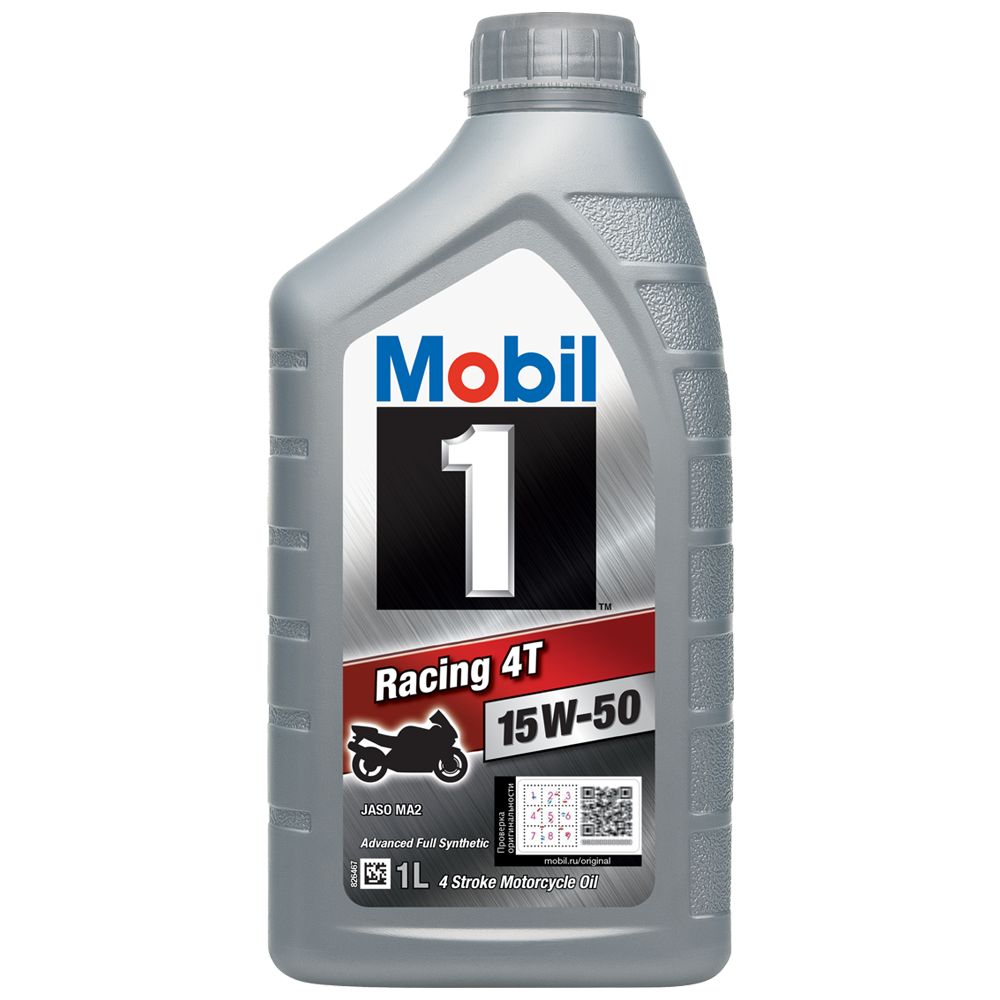
Pros
- Primarily for on-road, high-performance
- Re-engineered for cleaner running engines
- Optimized for high-temperature durability
- High-performance additive system
Cons
- Shifting issues
You need an oil that can withstand the added pressure and heat produced if you ride a high-performance bike. You can shift more quickly and smoothly thanks to the lubrication provided by this synthetic racing oil.
It has been redesigned to keep your engine cleaner, lowering the amount of dirt and debris and maintaining a smoother-running engine. To ensure that performance is not compromised while riding hard, the additive formula has also been specifically designed to perform better in high heat.
Unfortunately, some riders have voiced complaints about shifting problems. But this is more of a singular issue and a bike-specific complaint. If you subject your bike to a lot of grit and dirt, this isn’t the oil for you either. For applications other than off-road, this oil performs better.
Best for Hot Weather: Lucas High-Performance Motorcycle Oil
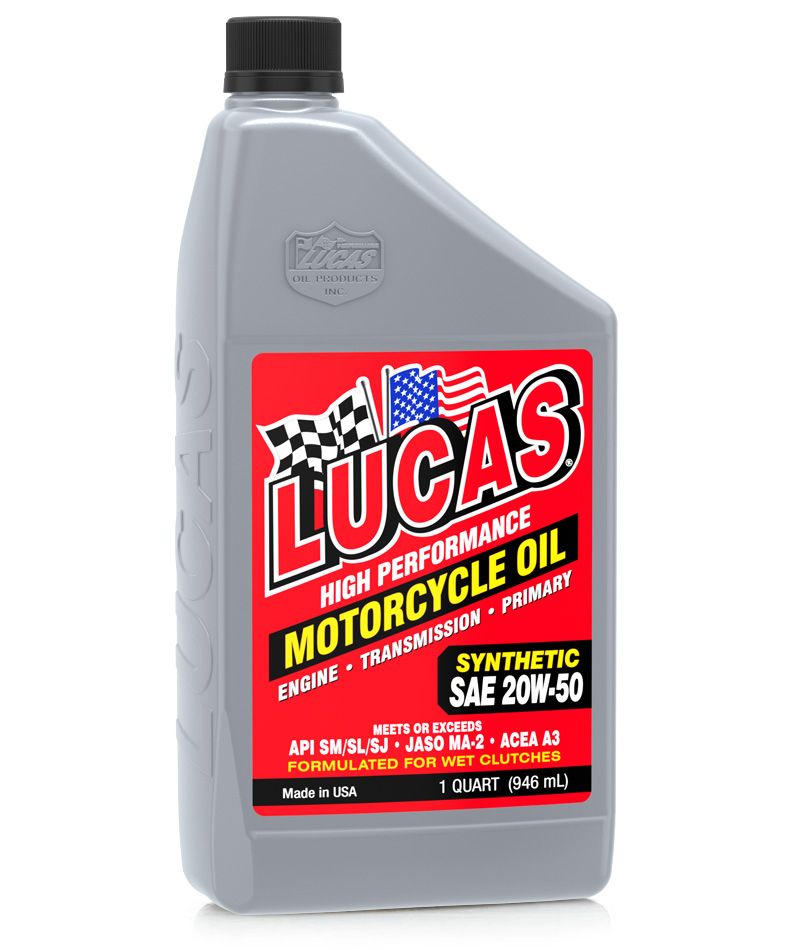
Pros
- Great for Harleys
- Smoother engine with less noise
- Keeps the engine cool in extreme conditions
- Smooth shifts
Cons
- Oil pressure is stumpy at low speed
- Price is higher
There is no crude oil in this pure synthetic oil. Due to its meticulously refined manufacturing process, this oil is guaranteed to withstand extremely high riding temperatures both on and off the track. It works well with Harleys as well because they frequently run hot.
You’ll appreciate how smoothly and quietly the engine runs and how well this oil lubricates. The formula actively lowers your engine’s temperature, extending its life and lowering the possibility of warping or damage.
This oil is what you need if you want an oil that goes above and beyond OEM requirements. The only issue I have with this oil is that it can cause your engine to feel slumped or stumpy at low speeds.
Additionally, it tends to bog down more quickly when temperatures drop because it is built to perform at its best at higher temperatures. The extensive and complicated manufacturing process needed to produce it also makes it significantly more expensive.
Best for Cold Weather: K&N 10W-40 Synthetic Motor Oil
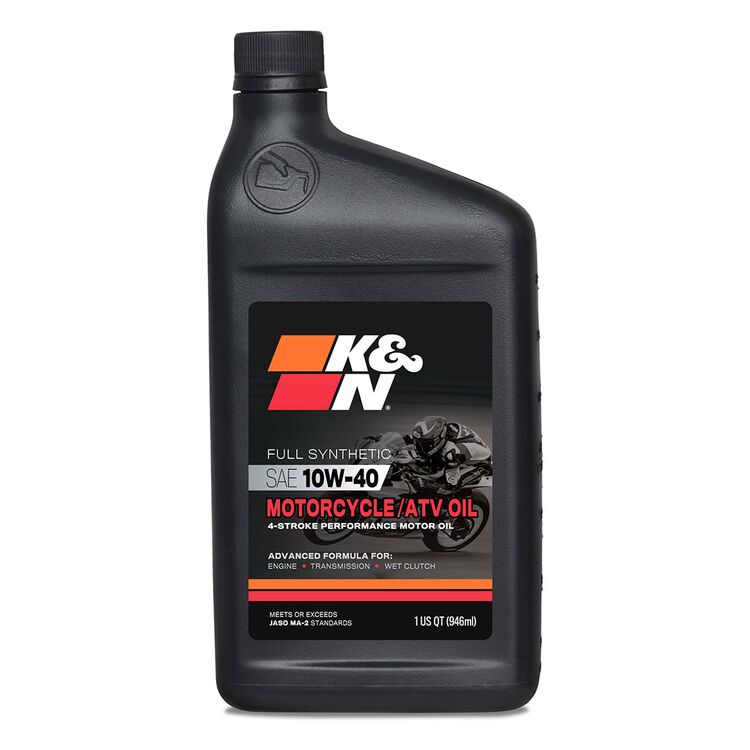
Pros
- Engine, transmission, wet clutch, and primary compatible
- 3-In-1 advance formula
- Cold start protection
- Smoother shifting support
Cons
- Not as well-known
- Designed for use with K&N oil filters
K&N is likely already known to you as a performance booster. Did you know they produce motorcycle oil as well? This three-in-one mixture was made to work with a K&N oil filter. It will safeguard your engine, transmission, and primary, according to the manufacturer.
Your engine will be better protected during cold starts thanks to the 10W-40 formulation. Your starting components will last longer as a result of less stress being placed on them. Once the engine is running, the oil improves performance and makes shifting quieter.
Unfortunately, K&N oil is not a well-known brand, which can cause people to have doubts about its performance. If you aren’t also prepared to spend money on a K&N oil filter, you won’t get to see its full potential.
Buyer’s Guide for Finding a Motorcycle Oil
A motorcycle engine is powered by a number of interconnected parts, including carbon brushes, axles, and more. Motorcycle oils are used to cool these moving parts, lubricate them, and control friction between them throughout the process.
But the best performance from these oils depends on their careful selection to match the engine’s activity.
Choosing a motorcycle oil can be challenging, so we’ve put together a guide with all the facts, advice, and strategies you need to know before buying motorcycle oil in 2023.
Customer Feedback
If you don’t know anything about motorcycle engine oils or only have a general understanding of them, it’s best to rely on the advice of experts or the best motorcycle oil reviews. However, you cannot simply walk into a store without any knowledge of the motorcycle oil options and ask someone else to make the decision for you.
Let me remind you that you are the motorcycle’s owner. Nobody is going to know your motorcycle better than you do when it comes to choosing the right oil. The only remaining choice is to read an online review, which is, in my opinion, a much better idea than going into a store.
Understanding the benefits and drawbacks of various motorcycle oils is made easier by reading online reviews. Furthermore, since you are considering your options, no pressure will be placed on you to make a quick decision.
In conclusion, I would say that purchasing motorcycle oil online these days is probably the best choice because you can get the best motorcycle oil for your motorcycle at a better price.
Engine Compatibility
You must determine which type of motorcycle oil is best for your vehicle: synthetic, mineral, or semi-synthetic.
You must evaluate your motorcycle’s requirements and choose the best option after checking the compatibility. Remember that if you make the wrong decision, you won’t just waste money; you’ll also shorten the lifespan of your motorcycle.
Levels of Viscosity
When selecting a motorcycle oil, viscosity is a crucial factor to take into account. Professionals claim that viscosity, particularly when exposed to high temperatures, has a significant impact on how well a motorcycle engine performs.
Types of Additives
When selecting a motorcycle oil, looking at the additives is a very common and crucial consideration. As we previously discussed, detergent is a component of mineral oil.
Detergent also has the ability to remove debris and acids from the engine, ensuring that it is kept clean and functions without issue. Furthermore, it enhances cooling and lubrication.
Price & Efficiency Ratio
The majority of people have different perspectives on cost and efficiency. Some claim that products that are less expensive are less effective. But that is simply an outdated myth.
Efficiency must always take precedence over price when purchasing motorcycle oil because efficient motorcycle oil will deliver the best performance for a significantly lower price. You’ll see that the product offers excellent value for the money when it starts to give more for less.
Riding Habits
You should also consider your riding style when looking for the best motorcycle oil because different riding styles require different types of oils.
If you’re a performance enthusiast, you should think about getting synthetic oil because hard riding raises engine temperatures, and synthetic oil is made to keep engines cool and resist breakdown at high operating temperatures. Consider mineral oil if you would prefer to simply cruise around.
Why You Should Buy High-quality Motorcycle Oil?
For your engine’s health, performance, and lifespan, the right motorcycle oil is brimming with ingredients that are essential. Let’s take a look at some benefits of choosing the right motorcycle oil:
- Motorcycle oil is made primarily for lubrication. In order to prevent wear from friction, a thick layer of slick oil is applied to every part of the engine. This results in better, smoother performance and a continuous flow
- Motorcycle oil’s two main components are base oil and additives. Lubrication is handled by base oil, and additives provide additional safety by keeping the engine parts clean. A high-quality motorcycle oil effectively cleans up these parts, specifically targeting carbon formations
- Motorcycle oils are made to repel heat as well. It’s crucial to maintain oil temperature below flashpoint, and using the right oil will help it stay cool
- Regularly using the right kind of motorcycle oil results in better performance, which has the added effect of prolonging the engine’s lifespan — it essentially keeps the internal parts of the engine clean by lowering the risk of sludge buildup
- With well-lubricated parts and a clean engine, you’ll notice better fuel efficiency and maximum mechanical output from your bike
- Buying premium motorcycle oil will save you the cost of frequent oil replacements and having to deal with increased fuel consumption
Conclusion: Keep Your Bike Running
The top engine oil illustrations were already provided for your viewing. These are the best engine oils available.
- Best Overall: Castrol Motorcycle Oil
- High Quality: Valvoline 4-Stroke Motorcycle Oil
- Best Performance: Kawasaki Motorcycle Engine Oil
- Another Great Option: Motul Aceite Motorcycle Oil
- Best Value: Honda Pro GN4 Motorcycle Oil
- Best Synthetic: Mobil 1 Racing Engine Oil
- Best for Hot Weather: Lucas High-Performance Motorcycle Oil
- Best for Cold Weather: K&N 10W-40 Synthetic Motor Oil
However, if you ride your motorcycle more frequently in the summer, Lucas High-Performance Motorcycle Oil is the best option for you. We recommend Castrol Motorcycle Oil because it can offer good gear protection for your motorcycle.
The minor exterior ding you’re concerned about is less significant than an effective engine. Over time, engines experience inevitable wear and tear that can only be delayed and managed through proper lubrication.
Motorcycle oils are made with properties that can maintain the engine’s temperature while keeping it thoroughly lubricated and free of any impurities that might otherwise cause friction.
FAQs
Is Synthetic Oil Good for Motorcycles?
Synthetic oil is beneficial for motorcycles, yes. Modern synthetic oils are of the highest quality and contain additives that make your motorcycle run cleaner and better. Better at capturing and suspending impurities is synthetic oil. Additionally, it flows more easily in cooler temperatures and degrades more slowly in hot ones.
How Often Should I Change the Oil in My Motorcycle?
You should change the oil in your motorcycle every 2,000 to 3,200 miles if it is made of mineral components. Every 5,000–8,000 miles, semi-synthetic oil needs to be changed. Even if you don’t drive this many miles each year, it’s a good idea to change your oil at least once a year.
Can I Use Car Oil for Motorcycles?
Absolutely not; never use car engine oil on a motorcycle. The first is designed for motorcycle engines, while the second is for car engines. Friction modifiers found in car engine oil can impair the performance of your motorcycle.



